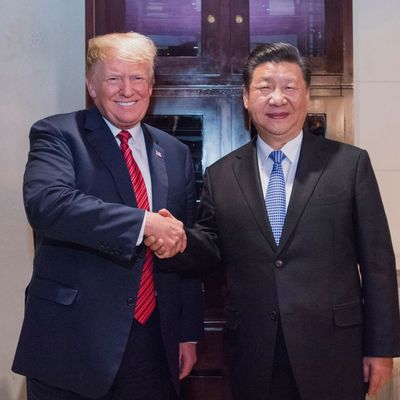
It’s one of the core contradictions of Trump administration economic policy: President Trump “places as much importance on the health of the Dow Jones Industrial Average for validation of his job performance as he does with his polling numbers,” The Wall Street Journal reported last week; yet he insists on pursuing protectionist trade policies that markets have repeatedly demonstrated they hate and will punish with falling prices.
It may be that the president learned the wrong lessons from the market’s strong performance in 2017.
I am not in the camp that gives Trump no credit for the strong stock performance in the year following his election. Trump’s key legislative accomplishment — the tax reform bill — reduced the tax burden on corporations and therefore was positive for stock values, whatever its indeterminate effects on the overall economy. And Trump chose a Federal Reserve chairman, Jerome Powell, who was clearly going to pursue a continuation of Janet Yellen’s monetary policies, instead of making a more hawkish pick like John Taylor, who might have hurt stock values by hiking interest rates too quickly.
Those choices, when combined with a good global economic environment, helped produce very strong stock performance in 2017. The positive updraft for stocks was so strong that whatever the president threatened or did on trade — even if negative for the market on a day-to-day basis — got lost as noise amid a positive overall stock-market narrative.
Now, the overall narrative is not so positive. It’s not clear that we are headed for a recession, but a variety of financial indicators have moved sharply negative in the last few months. There are worrying signs of a global slowdown in economic growth.
This means the president’s actions on trade no longer get lost amid a sea of positive news for stocks. If stock prices fall on a given day because the president is ratcheting up his trade-war rhetoric, that becomes part of an overall narrative of weak stock performance — that is, when the president causes stocks to fall, people notice more.
The president has tried to shift the blame for falling stocks to Jay Powell, his own appointee at the Fed. This is deflection; as I’ve written before, it’s hard to imagine how Trump could have found a Fed chair who would have been more congenial for stock prices than Powell.
But if Trump wants to stop being blamed when stocks fall, there is an easy strategy available to him: Stop doing things that make stocks fall. Stop threatening to impose new tariffs, stop doing things that hurt the interests of U.S. businesses that depend on exports or imports. Try to imagine what Gary Cohn would advise him to do about trade, then do that.
The president sent a signal a week ago that he at least partially understands this, when he announced after the G-20 summit that he was close to a deal with China on trade. He gets it: A trade war is bad for stocks; averting the trade war is good for stocks.
As part of the announcement, he pushed back his deadline to impose new tariffs on China by two months, which was also a bullish action: It delays the trade war, and possibly allows him to avoid it altogether. And the announcement produced the effect Trump desired: Higher stock prices.
Unfortunately, the deal the president announced does not appear to exist. As the markets figured that out, they gave up the gains they made after the president’s deal announcement and then some.
But the president can still take a lesson from those market moves. The markets would like a deal on China: Not necessarily one that resolves all the long-standing, substantive trade disputes we had with China long before Trump was president, but at least one that avoids the imposition of costly and disruptive tariffs on both sides.
It would behoove him to deliver something along those lines: A clear and durable signal that there will be no trade war with China — not just through the end of February, but for the rest of the president’s service.
Sending that signal might entail an embarrassing climb-down for Trump, but it would make stocks go up. And if the president cares as much about stock prices as The Wall Street Journal says he does, it’s a price he should be willing to pay.





























